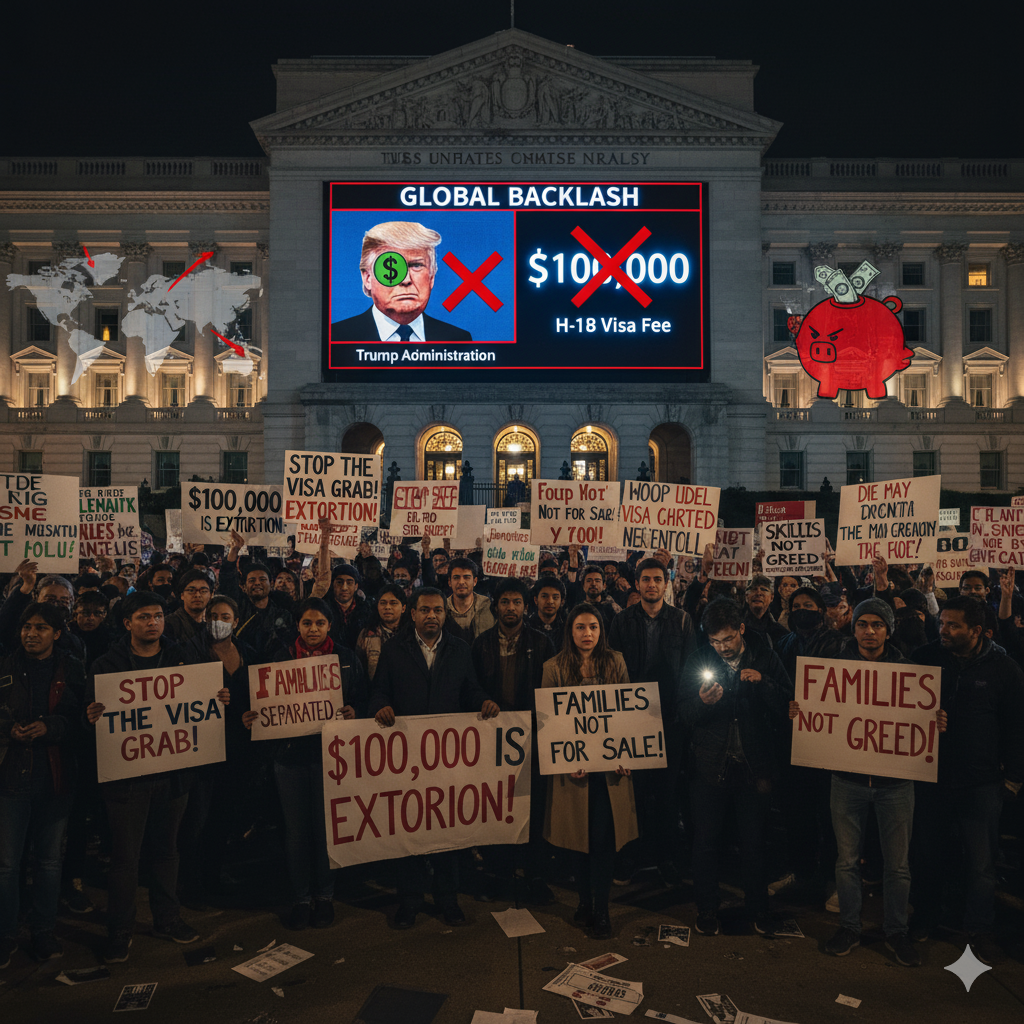Introduction: A Policy Earthquake in US Immigration
In September 2025, President Donald Trump’s administration unveiled one of the most controversial immigration policies in recent history: a $100,000 annual fee for H-1B visa applications. Marketed as a “national security and economic fairness” measure, the fee has shocked international governments, global businesses, and immigrant communities. India, the largest source of H-1B visa holders, has warned of “humanitarian consequences,” while prominent tech executives — including Elon Musk — have voiced sharp criticism despite once backing Trump’s tougher stance on immigration.
The decision could reshape the future of America’s technology workforce, global talent flows, and US-India relations, while raising fundamental questions about fairness, economics, and national identity.
Understanding the H-1B Visa and Its Importance
The H-1B visa program allows US companies to employ foreign professionals in specialty occupations, particularly in science, technology, engineering, and mathematics (STEM). Since its creation in 1990, it has become a lifeline for Silicon Valley and industries dependent on high-skilled labor.
According to US Citizenship and Immigration Services (USCIS), nearly 85,000 H-1B visas are issued annually, with India accounting for about 70 percent of recipients. For decades, the program has been hailed as a driver of American innovation, with immigrants founding companies like Google, Microsoft, and Tesla. Critics, however, argue that it suppresses wages for American workers and fuels outsourcing.
Trump’s $100,000 fee represents a seismic shift in how the program is managed, effectively transforming it from a pathway to talent into a luxury reserved for only the wealthiest corporations.
The Rationale Behind Trump’s Move
The Trump administration framed the new fee as a tool to “protect American workers” and curb what it describes as abuse of the H-1B system. By drastically increasing costs, the White House claims it will reduce dependency on foreign labor and create opportunities for US citizens.
Supporters of the policy argue that many large corporations — especially in the IT outsourcing sector — exploit H-1B visas to underpay foreign workers and displace American professionals. They see the $100,000 annual charge as a deterrent, ensuring only firms with genuine high-skilled needs pursue applications.
However, critics argue that this is less about protection and more about exclusion, designed to choke off immigration under the guise of fairness.
India’s Strong Reaction
India’s Ministry of External Affairs issued an unusually sharp statement, warning that the move would have “severe humanitarian consequences” for hundreds of thousands of Indian families who depend on H-1B pathways. For many, the visa is not just a work permit but also a stepping stone to permanent residency and eventual citizenship.
The Indian government fears that the fee will price out small and medium-sized companies, block opportunities for talented young professionals, and widen inequality between the wealthy elite and ordinary workers. With remittances from H-1B holders contributing billions annually to India’s economy, the stakes are both personal and national.
Diplomatic channels are already strained, and analysts warn this could trigger retaliatory trade or immigration measures by New Delhi.
Tech Industry Outcry: From Musk to Startups
Perhaps the loudest opposition has come from the US tech industry. Elon Musk, who previously supported Trump’s calls for reforming H-1B visas, reversed his position after the announcement. Musk stated on X (formerly Twitter): “This policy kills innovation. America was built on immigrant talent — taxing it at $100k a head is insane.”
Other CEOs, including Sundar Pichai (Google), Satya Nadella (Microsoft), and Mark Zuckerberg (Meta), have voiced similar concerns. They argue that the new fee will deter companies from hiring global talent, stifle research and development, and push firms to relocate jobs overseas.
Startups are particularly vulnerable. Unlike billion-dollar corporations, small firms lack the resources to pay such exorbitant fees, potentially leading to a chilling effect on entrepreneurship in the US.
Economic and Humanitarian Impact
The economic fallout of the policy could be severe. According to the Migration Policy Institute, H-1B workers contribute tens of billions annually to the US economy, not only through taxes but also by fueling sectors like housing, healthcare, and education. A sudden reduction in skilled immigration could lead to labor shortages in key industries, especially technology, healthcare, and finance.
On the humanitarian side, the burden will fall hardest on immigrant families. Many H-1B holders live in the US with spouses and children, often caught in “visa limbo” for years while waiting for green cards. With employers potentially unwilling to pay the new fees, thousands could face job loss, forced relocation, or family separation.
Advocacy groups have described the move as “cruel and discriminatory,” arguing that it weaponizes immigration to score political points at the expense of human dignity.
Global Ripple Effects
The consequences extend beyond US borders. Countries like Canada, the UK, and Australia, which actively court skilled immigrants, stand to benefit as disillusioned professionals look elsewhere. Canadian Prime Minister Justin Trudeau even tweeted that Canada “welcomes the world’s talent without a $100,000 entry tax.”
For India, the policy could redirect skilled workers toward domestic opportunities, potentially fueling local industries but also causing brain drain anxiety if talent migrates to other destinations instead of returning home.
The policy may also impact US diplomatic ties, especially with allies in Asia and Europe who rely on H-1B opportunities for their citizens. It signals a broader shift toward isolationism at a time when global collaboration is increasingly necessary.
Domestic Politics: Trump’s Immigration Gamble
For Trump, the $100,000 H-1B fee is part of a larger immigration platform designed to energize his political base. Restricting visas plays well with nationalist voters who believe immigration undermines wages and cultural identity.
However, the backlash from industry leaders, immigrant communities, and foreign governments raises questions about whether the policy could backfire. Economists warn it risks damaging America’s innovation ecosystem, while political analysts note it could alienate independent voters concerned about fairness and humanitarian impacts.
Conclusion: A Defining Moment for US Immigration
The Trump administration’s imposition of a $100,000 annual fee on H-1B visa applications marks a defining moment in America’s immigration history. While framed as a protectionist measure, it risks undermining the very foundations of US innovation, diplomacy, and economic competitiveness.
India’s warnings of humanitarian fallout, the tech industry’s fierce opposition, and global skepticism suggest this policy could have far-reaching consequences well beyond immigration. It reflects a deeper struggle over what kind of nation the US wants to be: one that welcomes global talent and thrives on diversity, or one that walls itself off in pursuit of short-term political gains.
For now, the world watches as immigrants, families, companies, and governments weigh their options. The stakes are not just about visas — they are about the future of America’s role in a globalized world.







